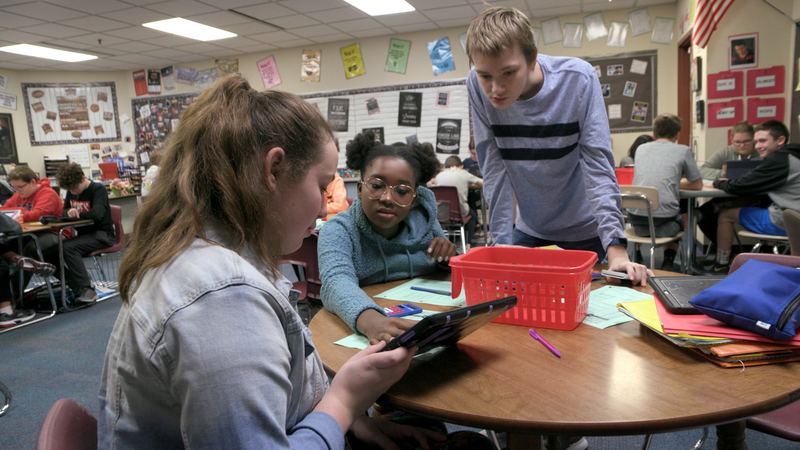
The Hidden Arithmetic of Everyday Life
MOVIE REVIEW
Counted Out
–
Genre: Documentary
Year Released: 2024
Runtime: 1h 29m
Director(s): Vicki Abeles
Where to Watch: releasing theatrically, see screenings here: www.countedoutfilm.com
RAVING REVIEW: COUNTED OUT makes a simple, potent claim: in a world arranged by code, statistics, and algorithms, math is a language of power—and literacy in that language affects who gets hired, who gets heard, and who gets a real say. Vicki Abeles builds that claim into a focused documentary that treats mathematics not as a test to pass but as a civic tool. The result is engaging, unusually clear, and sincere about the shame and anxiety that many people still carry from their school days.
Abeles splices classroom moments, lived experience, and commentary into a steady cadence: we watch a student face down long-held math phobia; we hear a parolee explain how an unknown risk algorithm determined the length of his sentence; we listen as scholars connect dots between gerrymandering, recommendation engines, and the ways numbers define public life. That keeps abstraction at bay. When the movie says math underwrites the news you see, the job you land, or the weight your vote carries, it shows you the mechanism and gives you a person living with the outcome.
Abeles locates the narrative “I’m not a math person” as both a learned defense and a form of exclusion: if you believe the conversation isn’t yours, you sit out the places where numbers set the rules. This is where the movie feels most alive. Teachers model iteration instead of humiliation; a parent returns to community college in pursuit of a career that math anxiety once made feel impossible; and experts demystify “the layer beneath”—district maps, loan approvals, and content feeds.
Abeles’s civil-rights framing gives the documentary its spine. By dedicating the film to Bob Moses—and letting his voice and Algebra Project philosophy recur—the movie draws a clear line from voter-registration work in the 1960s to math-literacy work in the 2020s. The argument holds because it’s practical: a democracy that relies on understanding numbers, models, and margins can’t be healthy if most people feel alienated from these tools. When mathematician Ismar Volić explains how mathematics clarifies representation and voting, the film shows math functioning as public infrastructure, not a club for the gifted.
The film’s classroom perspective, while empathetic, occasionally skews toward secondary and postsecondary moments. Early childhood and K–8 voices are comparatively light, even though math identity and anxiety often calcify in those years. Hearing more from elementary educators—especially those navigating multilingual classrooms or resource-strapped districts—would have rounded out the world that the film describes. The film excels at turning fear into agency. A standout moment follows Glenn Rodriguez, who reverse-engineered a parole algorithm and exposed its flaws. That story embodies the film’s core thesis: math can be a tool for self-advocacy and systemic accountability. Likewise, the sections on data literacy and journalism (anchored by Julia Angwin’s perspective) provide viewers with a concrete understanding of how to question, understand proxies, and parse what an algorithm optimizes for.
While technology is present, the film’s definition of “math” is broader: modeling uncertainty, understanding scale, recognizing bias in metrics, and building the stamina to iterate. That breadth matters because it reframes the concept of inclusion. The goal isn’t to jumpstart a generation of software engineers; it’s to make the “layer beneath” legible so more people can participate in shaping it. COUNTED OUT continually returns to the theme of belonging. People flourish when they see themselves as capable, and institutions are better when the public understands and challenges how numbers are used. The film argues that both of these outcomes depend on changing daily practices: how teachers frame mistakes, how journalists present margins of error, how policymakers justify thresholds, and how communities learn to ask, “who made this and why?”
If there’s a bottom line, it’s this: COUNTED OUT is persuasive not because it scolds the viewer, but because it invites them into the conversation. It argues that math literacy is a shared civic resource, and it demonstrates the impact of claiming it—confidence expands, options open, systems become somewhat more accountable to the people they govern. The film left me energized, convinced of its mission, and—importantly—inspired me to want the discussion to continue. That combination of clarity, compassion, and consequence earns it a strong recommendation and lines up with the positive impression you flagged.
Please visit https://linktr.ee/overlyhonestr for more reviews.
You can follow me on Letterboxd, Instagram, Twitter, and YouTube. My social media accounts can also be found on most platforms by searching for 'Overly Honest Reviews'.
I’m always happy to hear from my readers; please don't hesitate to say hello or send me any questions about movies.
[photo courtesy of REEL LINK FILMS]
DISCLAIMER:
At Overly Honest Movie Reviews, we value honesty and transparency. Occasionally, we receive complimentary items for review, including DVDs, Blu-rays, CDs, Vinyl Records, Books, and more. We assure you that these arrangements do not influence our reviews, as we are committed to providing unbiased and sincere evaluations. We aim to help you make informed entertainment choices regardless of our relationship with distributors or producers.
Amazon Affiliate Links:
Additionally, this site contains Amazon affiliate links. If you purchase through these links, we may receive a commission. This affiliate arrangement does not affect our commitment to honest reviews and helps support our site. We appreciate your trust and support in navigating these links.



Loved Counted Out for its perspectives about mathematics and its relevance to everyday life.
As a former high school English teacher who has been afraid of math my entire life, I welcomed the points in this worthwhile film.
Love this response! I’ve always been “bad” at math, barely passing, but this doc really made me feel like that was okay! I hope there’s a lesson to be learned from it for the larger world!